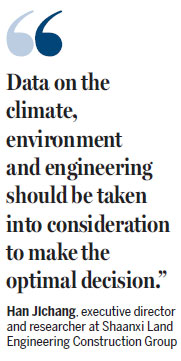Natural engineering reclaims polluted land
The land once contaminated by heavy metals in Shaanxi province, has now become the first rocky gold mine theme park in western China due to the efforts of a local team of experts.
Han Jichang, leader of the team, who is also executive director and researcher at Shaanxi Land Engineering Construction Group, said they planted herbaceous plants, fungi, algae and ferns in the polluted soil to absorb the heavy metals, using a technology called soil organic reconstruction.
Xie Jiancang, an expert on water conservation from Xi'an University of Technology, said the method helps to balance the amount of different components of the earth, including plants and micro-organisms, and the nutrition of the soil itself.
Han and his team also applied the technology to improving soil and water loss in the western bank of the Yellow River in Weinan, Shaanxi province.
The width of the river expands from 100 meters to four kilometers when it reaches Weinan, causing flood, soil erosion and damage to the banks and farmland.

Han began the project to solve these problems in April 2015. To date, 8 square kilometers have been turned into rice and rapeseed farms. Tourists have also come to visit the farming landscape.
The Chinese government is working to prevent and control soil pollution and plans to set aside 1.7 trillion yuan ($250 billion) for the recovery of polluted land by 2020, when 90 percent of polluted farmland and soil will have been treated for safe use.
Changan University in Xi'an announced in March that its application to establish a land engineering program has been approved, the first of its kind in China.
Han said: "Land engineering involves design, mechanics, biochemistry, as well as water conservation, which should be an independent research subject."
The organic reconstruction of soil, as a core technology of land engineering, aims to provide healthy land for plants and humans to grow, Han said. "It would help human beings to smell the aroma of soil in cities again and to live on safe and clean land," he said.
Since the concept of organic reconstruction was proposed, questions - such as what crop should be planted after reconstruction - still remain to be answered, he said.
"Data on the climate, environment and engineering should be taken into consideration to make the optimal decision," he said.
(China Daily 04/19/2017 page19)














